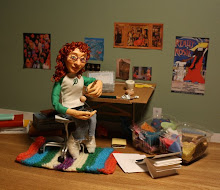
I read an ARC of Wood's T
he Incorrigible Children of Ashton Place: The Mysterious Howling a number of months ago and absolutely adored it. But today, when I went to post on the audio book version, I discovered my total failure to post my adoration here.
Incorrigible Children stars Miss Penelope Lumley, a 15 year old from the Swanburne Academy for Poor Bright Females. Penelope is educated, well-mannered, and purposeful. When she discovers the children she has been hired to care for were raised by wolves, she takes it in stride. Despite the low expectations of the foundling's parents, Miss Lumley soon has them learning manners, Latin, and how to refrain from chasing squirrels.
It is Miss Lumley's strong character and the wonderfully Gothic voice that pulled me in. The story is dark and mysterious, but also, let's face it, silly. People have been comparing it to Snicket's
A Series of Unfortunate Events, and this book deserves to be compared to Snicket. The tone and length of
Incorrigible Children is very similar to Snicket's, as is the middle-reader audience suggestion. And it manages to be just as dark and strange and wonderful. But don't think this is a knock-off, the adventure goes very much in it's own direction and Wood possesses a strong voice all her own. I also think the 15 year-old age of Miss Lumley, and the amount of time the reader shares with her, may also recommend the book to a slightly older (and perhaps reluctant) readership.
Now the audio book. Katherine Kellgren did the audio books for the Enola Holmes series, which I adored. Her beautifully expressive voice and accent are perfect for books written to sound like British children's classics. If I had been asked to choose the reader for
Incorrigible Children, it would have been Kellgren, and we are so lucky to have her vocal skills for this audio book (now I just need to get my hands on a copy).
And now for more Maryrose Wood! While picking through an avalanche of ARCs, I came across
The Poison Diaries, due out in August. It wasn't until I read the author's bio that I even realized the author was Wood (I'm sorry. I know I should remember these things, but most of the time it's the cover image that stays with me; I am an illustrator after all).

The tone of
The Poison Diaries is not as much fun as
Incorrigible Children, but I think that is due to the difference in audience (teen versus middle reader). While I prefer the narration in
Incorrigible Children, The Poison Diaries is good. Allow me to elaborate; there is a lot of rubbish being published today as publishers look for the next big teen or crossover phenomenon. But there are gems in the rubbish heap, it just takes a lot of digging. As romantic Teen novels go,
The Poison Diaries is a good one.
The book is told in the first person, and we begin listening to the narration of Jessamine, the daughter of a herbalist with a special garden devoted to poisonous plants. Jessamine is not allowed in the poison garden, despite the fact that she is no longer a child, something that grates on her nerves. But Jessamine's life is changed by the arrival of very strange young man called Weed, who, according to the keeper of a madhouse, can cure the mad and make the sane sick. Weed, Jessamine's father is assured, is mad, but her father is also certain that Weed possesses a vast knowledge of plants that should not be kept secret. But through Weed's own voice (he narrates a few of his own chapters) and Jessamine's discussions with him, we learn that Weed's skill comes from his ability to talk to plants.
The tale, based on a concept by the Duchess of Northumberland, is dark and intreguing, with a cliff-hanger of an ending indicating sequels to come. Readers will enjoy Weed's growth (it has to be a pun, horrible though it may be) and the budding relationship (ditto) between him and Jessamine. And when you throw some poison on that lot, the intrigue only increases.



